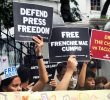How I wish I could visit Maricon in Batangas. But I wish more that she’ll be finally released. For now, I’m keeping her words deep inside my heart: “We will not stop until we break these bars and until victory and freedom is achieved.”
By KRISTA V. MELGAREJO /Contributor
Davao Today
The letter I received from her brought back old memories. Memories that marked our age of innocence, when most of us lived in a bubble, protected from the harsh realities beyond home and the school grounds.
We went to the same academic institution both in elementary and high school. She was not just an ordinary student for she was smart, talented and a natural born leader. In fact, she was always voted class president.
In her senior year in high school, she became the vice president of the student coordinating council. In the same year, we worked together as officers in the same academic student organization.
A few months after graduation, it was time to move to college. While I remained in Davao to study at the University of the Philippines-Mindanao, she moved up north and studied in UP-Baguio.
Indeed, life takes many of us — the people whom I’ve dealt directly or indirectly in those 13 years of my life — in various directions. And realities come crashing in like waves on a shore line.
Some friends stay in touch. But with others, there is rarely any contact at all.
I realized that as we grow older, we slowly move out from that bubble that protected us. Yet life gives us a chance to cross paths with old friends, after being apart for so many years.
‘Freedom’
Her name is Maricon Montajes. She was born on the 25th of February, the same date that the people power in Edsa brought down the 20-year dictatorial rule of Ferdinand Marcos. Because of it, she was given the nickname ‘Freedom.’
When she was younger, she couldn’t pronounce the ‘f’ in ‘Freedom’ and in the long run, people called her ‘Eedom.’
When Maricon studied in Baguio, she became a photojournalist for UP-Baguio’s Outcrop. But after a school year, she transferred to UP-Diliman and took up a course on Film and Audio Visual Communication.
And just like the good old days, Maricon continued to be active in campus. As a student in the College of Mass Communication, she became a member of the UP Sining at Lipunan (UP Silip), an organization dedicated to serve the people through film, documentary and other forms of art and media.
As she learned more about the plight of the ordinary people, she decided to go to the countryside to integrate with the peasants. She also wanted to use her background in film to enlighten more farmers about their situation and why it is so. In the process, her understanding on the social situation became deeper.
Maricon was doing her thing while I’m doing mine. And as luck would have it, after five years, our paths crossed again, albeit not directly. The “reunion,” I should say, was indeed in a very unexpected circumstance.
Breaking dawn in Batangas
“June 3, 2010 is a date that I will surely never forget. Though three years had already passed, our experience on that fateful day will always remain vivid,” wrote Maricon.
She narrated that after her community integration along with Rommiel Cañete and Ronilo Baes, they have to look for a place to rest for the night. They stayed at a peasant family’s home in Mabayabas village, Taysan town in Batangas.
What ought to be a rest for another day’s integration turn out a nightmare. At about three in the morning, members of the 743rd Squadron Combat Group of the Philippine Air Force surrounded the peasant family’s house and conducted a raid.
Maricon and her companions tried to hide for safety. As soldiers indiscriminately fired, shrapnels hit her forehead. After the military operation, she was brought to the Philippine Air Force (PAF) hospital for treatment.
The three were then transferred to the military camp. Maricon shared that the military interrogated them for five straight days. She said they were psychologically tortured and threatened. They were not even allowed to contact their families or even seek legal counsel.
On June 8, they were transferred to the Batangas Provincial Jail (BPJ). A day after, they were charged with illegal possession of firearms and ammunition, illegal possession of explosives, violation of Omnibus Clection Code Section 261 Category P, violation of Omnibus Election Code Section 261 Category Q, and a separate case of frustrated homicide for Baes.
Maricon and her companions were accused as members of the New People’s Army (NPA). But I know they are not. They don’t even have guns when they were raided.
Until now, my old friend Maricon and her companions are still being detained at the BPJ.
430 and counting
Maricon and I have the same principles. Maybe because we share the same thoughts about the plight of the Filipino people. Maybe because we see the inequities, even right in UP, the so-called university of the “iskolar ng bayan.”
Because of student activism, I have known the Comprehensive Agreement on Respect for Human Rights and International Humanitarian Law (Carhrihl), the first-ever comprehensive agreement signed on August 7, 1998 by the Government of the Republic of the Philippines (GRP now GPH) and the National Democratic Front of the Philippines (NDFP). It covers not only the parties involved, but also includes every Filipino citizen, my friend Maricon included.
Under the Carhrihl, the term political prisoner is defined under the Hernandez Doctrine, referring to the case against the patriot Amado V. Hernandez (People vs. Hernandez, July 1956).
The doctrine states that whoever is involved in a political movement and participates in armed struggles to overthrow the existing government or ruling system, all his/her actions in pursuit of the political objective shall be assumed under the charge of rebellion, a political offense and thus should not be charged with illegal acts such as illegal possession of firearms. It differentiates these people as prisoners of conscience or belief and not as ordinary criminals.
I remember the conference I attended last 2011. It was about the GPH-NDFP peace talks where former Bayan Muna representative Satur Ocampo noted there is indeed a difference between Marcos and President Noynoy Aquino in terms of dealing with political prisoners.
A political prisoner himself back in the 1970’s, Ocampo said that though Martial Law was brutal, they were treated as political offenders. But today, political prisoners are treated as common criminals.
On that same year, the Aquino administration, through Presidential spokesperson Edwin Lacierda claimed “there are no political prisoners” in the country.
But people’s organizations, friends and family of the political prisoners know that the current administration is trying to hide its appalling human rights record from the public.
In an article published by Pinoy Weekly, Ching Montajes, Maricon’s mother, wrote about her disappointment over the current administration’s claim. It led her to question the President’s promise of ‘daang matuwid.’
“Freedom. Sadyang totoo lamang ang salitang ito bilang palayaw ng aking anak,” she wrote.
Currently, there are over 430 political prisoners detained in jails across the country, most of whom are charged under false accusations of committing various criminal acts.
Like Maricon, many political prisoners are suspected of being members or supporters of the NPA, the Moro Islamic Liberation Front and the Moro National Liberation Front. A lot of them reside in communities that are highly militarized because of the government’s counter-insurgency programs such as Oplan Bayanihan.
Behind bars
Maricon just celebrated her 23rd birthday last February. And it pains me that she’s been celebrating her special day inside the provincial jail for the past three years.
Along with Maricon, Rommiel and Ronilo, there are six other political prisoners detained at the BPJ, namely Charity Diño, Sonny Rogelio, Billie Batrina, Felipe Mendoza and Junver Tirasol. All of who are part of the Batangas 9.
In the letter, Maricon shared it was difficult to adjust to prison life. And it did take some time for her to know the way of living in prison, their fellow inmates and the challenges they had to face as detainees.
“Everyday life in jail means that we have a lot of time to do the things that we are allowed to do as long as it abides by the rules and policies of the BPJ. The only question is: how do you make your time worthwhile?”
For the majority of the inmates of the BPJ, most of their time is spent on daily routines implemented by cell leaders like cleaning, gardening, kitchen and cooperative duties. Other inmates also look for ways to earn a living like washing clothes, giving pedicure and manicure services or massages for other inmates and employees.
Maricon spends most of her time with her duties as treasurer and manager of their self-established cooperative, the Women’s Livelihood Cooperative.
“Almost half of my day is allotted for attending to the needs of the cooperative and mobilizing the whole cell and its members for it to operate everyday,” she said.
The cooperative has been able to provide for the needs of the female detainees and is successful in removing usury in their cell. It also made sure that every member works together to create a harmonious relationship amongst the inmates.
Aside from that, she said, their day is also spent getting to know other inmates, sharing experiences, skills and knowledge. It also opened her eyes to many things and has helped strengthened her belief that there is really a need to change the current system of society.
“I have learned a lot from the female inmates especially from their experiences from the brutality of the State, on how they overcame violence against women, of the society and most especially on how they struggled against it,” she said.
Being in jail has its ups and downs. She said that it showed her how cruel the State can be to those who move for social change. Peasants, workers and students like her are seen as criminals and sometimes even terrorists and they are taken and locked up. But she also saw this as an inspiration to continue living with her principles, as she deepens her understanding about the injustice and the abuses that happens inside the prison.
“As my imprisonment prolongs, I have learned to transform the walls, bars and barbed wires like a school, where a student like me is given an opportunity to absorb and learn from the struggles of the inmates, on how they were pushed by the harsh conditions to rebel and go against the so called ‘democratic’ system in our country,” she wrote.
Maricon said that within the prison walls, as the country’s condition becomes more critical, she has learned to strengthen her principles and face the challenges because, she said, these serve as a constant reminder that there must be a continuous and advancing struggle for human rights and for social change.
“Prison is just a small reflection of a larger prison, the society, which is still up to now, chained to imperialism, bureaucrat capitalism and feudalism. This inflames each and everyone of us to push harder and fight harder for the people’s rights,” she said.
Every now and then, Tita Ching, her mother, flies from Davao to Manila and travels by bus to Batangas to visit Maricon and to attend the hearings. Sometimes, students and teachers from UP Diliman come along with her and they travel in a convoy.
These visitations have kept Maricon’s spirit up and strengthen her. She said that even though they are incarcerated, thousands of people are still continuing the struggle for the people’s basic rights.
Steps toward freedom
Maricon and other political prisoners still see hope that their cases will be dismissed.
This after Ericson Acosta, a 40-year old political detainee, poet, UP alumnus and former Collegian Editor was released when the Department of Justice reviewed and dropped the cases against him. He spent two years in jail after members of the 34th IB arrested him in San Jorge, Western Samar.
“I am extremely joyful with the DOJ’s dismissal of the trumped up cases against my fellow Isko,” she said. “Definitely, this victory is just but one single step towards a larger victory — the freedom of the political prisoners in Batangas and the freedom of all the political prisoners in the Philippines,” she added.
Organizations both inside and outside the University call for the immediate release of Maricon and the rest of the Batangas 9. At the General Assembly of Student Councils held in UP Mindanao last April 2011, the body approved a resolution to campaign for their release. Just recently, the College of Mass Communication in UP Diliman launched “Project Freedom” for the same purpose.
While supporters, family members and friends continue the campaign, political prisoners also do activities to organize and mobilize other inmates such as hunger strikes and shirt printing. But Maricon said the most memorable one was held late last year, during the celebration of the Human Rights Week.
“It was worth remembering because the female inmates surprised me and Charity Diño with an award which they personally made,” she said.
The awards were two large keys made from illustration boards. The inmates wrote their messages for the two, thanking them for the things they have taught their fellow prisoners. They also wrote a message of support for the immediate release of the Batangas 9.
As the crisis in society worsens, Maricon said, more and more people are threatened of being captured and detained. “And as long as people are willing to continue the struggle, not only political prisoners like me will be set free, but the entire society,” she said.
How I wish I could visit Maricon in Batangas. But I wish more that she’ll be finally released. For now, I’m keeping her words deep inside my heart: “We will not stop until we break these bars and until victory and freedom is achieved.” (Krista V. Melgarejo/davaotoday.com)










